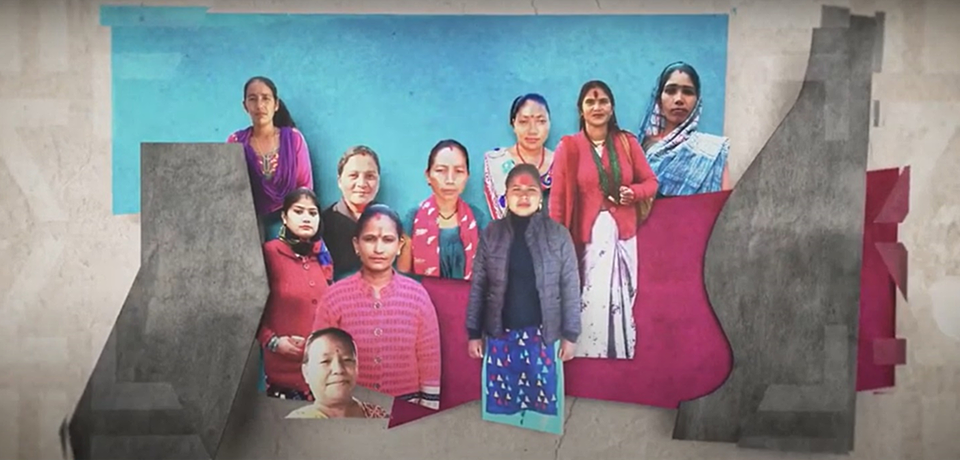Community-based justice amid COVID-19: An opportunity to advance Women’s Access to Justice in Asia and the Pacific
Date:
Authors: Doreen Buettner and Nadine Spalburg

Community-based justice plays a pivotal role in resolving disputes, especially in many developing countries where an estimated 80 percent of cases are resolved through grass-roots justice mechanisms. For women these mechanisms are often the first step on the pathway to justice seeking.
About 42 percent of women seeking justice face a great many hardships during the process. The list includes stress-related illness, relationship breakdowns, loss of employment and problems with alcohol or drugs.[1] To prevent such problems community support is crucial. To that end entire communities should be engaged to create an environment that allows women to seek remedies without negative implications. Addressing cultural and social norms that feed into gender discriminatory attitudes is essential to change such patterns of behaviour and outcomes for women.
In the past year, the socio-economic consequences of the COVID-19 pandemic have widened gender disparities and are adding barriers, particularly for already marginalized women. Women’s grassroots organizations are often the driving force behind the process of changing social norms and of confronting the challenge of biased mindsets through education, knowledge exchange and community dialogues. However, the pandemic has also deepened pre-existing women’s rights issues, which require redress at the national and local level.
During the COVID-19 pandemic, across the Asia-Pacific region the efforts of women’s rights organizations and the leadership of individual women at the community level have been significant. Women are on the front lines as health care workers, caretakers and community responders. In contrast, women’s representation and voices are lacking in the national pandemic response and in recovery decision-making. In a telling statistic, less than 1 per cent of the Global Humanitarian Response Plan for COVID-19 has been allocated to women-focused organizations.[2]
Previous health crises have demonstrated that women-led civil society organizations play a pivotal role in response and recovery, often reaching those furthest behind and providing unique expertise on gender issues[3]. We have collected impact stories from across the region on women’s leadership during the pandemic and brought them together in a video focusing on Women’s Access to Justice in a COVID World. What these stories highlight is that women’s active citizenship at the community level during the COVID crisis has opened up ways to navigate justice pathways in a way that drives better outcomes for women.
As we build towards a post-COVID society, we need to acknowledge women’s critical role at the forefront of post-pandemic policy formulation and decision-making. The opportunity to advance Women’s Access to Justice in Asia and the Pacific lies in women’s full participation and a people-centred justice approach, to address specific access challenges for women when they seek redress.
Subtitled versions in Bahasa Indonesia, Nepali, Tagalog, Tetum, iTaukei and English
These impact stories are part of an initiative titled Enhancing Access to Justice for Women in Asia and the Pacific: Bridging the gap between formal and informal systems through women’s empowerment and reduction of gender biases. This is under the joint UN Women, ICJ and OHCHR programme and generously supported by the Swedish International Development Cooperation Agency SIDA.
Under the Access to Justice programme we continue to support grassroots women’s organizations and gender-responsive community-based justice mechanisms. We do this by linking them to formal justice channels as well as by engaging women human rights defenders and whole communities to change social norms and to create an enabling environment for women to seek their rights.
__________________________________
[1] World Justice Project, “Women’s Access to Justice: A Global Snapshot”, 8 March 2019. See: https://worldjusticeproject.org/news/womens-access-justice-global-snapshot#&gid=1&pid=1
[2] Gender in Humanitarian Action, Asia and the Pacific, Closing the Funding Gap for Women-Focused Organizations Responding to COVID-19 in Asia and the Pacific (2020). See: Gender in Humanitarian Action, Closing the Funding Gap for Women-Focused Organisations Responding to COVID-19 in Asia and the Pacific, 2020
[3] UN Women, Action Brief, Women, Peace and Security. Women in decision-making:Covid-19 and beyond. Women, peace & security women in decision-making: COVID-19 and beyond